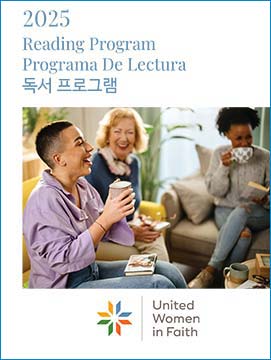
Latest News
Nov./Dec. response: The 2025 United Women in Faith Reading Program
by Emily Jones
A vigorous morning rain taps on my apartment windows while I write you this letter. The day’s work is calling, the children awake, and the inbox piling up. Yet, the rain keeps falling and I find myself longing for that wonderful trifecta of coziness: a fuzzy blanket, a steaming cup of tea, and a great book.
Whether you have a disciplined daily reading ritual with morning meditation in a favorite chair, or you take more of a catch-as-catch-can approach with a paperback stuffed in your purse for reading on the go, you have come to this catalog because you believe in the power of the page. United Women in Faith readers engage in many different ways. Some of us listen to audiobooks while commuting to work. Some of us savor the late-night hours to pour over each chapter again and again. Some of us power through a binge-reading session the day before the library return due date. Some of us read solo and some of us are part of book groups at church, online, or in our community. Whatever way works for you, we invite you to join us on this powerful reading journey!

United Women in Faith’s Reading Program (uwfaith.org/read) is designed to help women of faith achieve five key goals: lean into our spiritual growth, strengthen our leadership skills, equip ourselves for local and global mission, take faithful action for the common good, and build community in ways large and small. The books are current and cover a wide variety of topics. Participating in one of the Reading Program plans at any of the four levels, or even reading just one or two books in this catalog, can help you grow. And anyone, anywhere, can participate—whether you are a member of United Women in Faith already or just getting to know us.
Reading allows us to travel the world. I have never had the joy of visiting Nigeria, but Abi Daré’s novel, The Louding Voice, shrunk the 5,000+ miles between New York City and Lagos. By entering into the fictional world of Adunni, the teenage main character, my mind and heart were opened a bit more to the concerns of my Nigerian sisters.
Meanwhile, Linda Sarsour’s beautiful memoir, We Are Not Here to Be Bystanders, inspired me with its testimony to the power of intersectional organizing while reminding me that practicing real sisterhood requires intentionality. While Sarsour and I share a city, our identities are quite different. As she related her experiences as a Brooklyn-born Palestinian Muslim American activist, I found myself both nodding along in recognition and connecting the dots in ways I hadn’t previously.
Of course, sometimes the hardest gulfs to cross, the greatest contradictions, and the deepest chasms come not from across the globe or even across the city, but rather from the tensions we feel within our very own souls. We name and claim our relationship with God as Christian women, but do we always pay attention to the practices that nourish that most fundamental of relationships? Some days, the space between who we are and who we long to be can feel like the farthest of all possible distances. Barbara Peacock’s Spiritual Practices for Soul Care offers us 40 practical tools to go deeper in our Christian walk. This year’s bonus books, along with the other offerings in our 2025 Reading Program, are a powerful launching point for both personal reflection and meaningful conversation.
We encourage Reading Program participants to think of this catalog as a tool that you can use both individually and as a group:
For Individuals: Choose a Reading Program plan and select the books you’ll read. Get reading! When you’ve finished, complete the reporting form and turn it in to your Program Resources coordinator at the district or conference level to receive a certificate of recognition, awarded annually. Check in with the Program Resources coordinator about the due date and process for recognition in your conference/district.
For Groups: Use this catalog to select one or more books that you will all read and discuss together. Almost all the books in this year’s catalog make for good group discussion. But if you’re looking for a quick place to start, we’ve created a special section (new this year!) of this catalog that shares ways you can use our three bonus books for group discussion.
Recent polling suggests that 30 percent of American adults experience feelings of loneliness at least weekly. Chances are that many of these folks are in your communities—maybe even in your very churches. Consider this your call to action! Open your groups to other women in your community who may be looking for a way to connect and grow. Be diligent in your practice of gracious and intentional invitation. And if you don’t yet have a way to read and grow together in your community, consider whether this may be a new ministry worth exploring. You may consider starting a new group at your local church, or beginning a new, all-access group outside of the traditional structure. It is a balm to the soul to share in a sisterhood of spirit-filled readers committed to growing together and sharing the journey.
Blessings—and happy reading!
The Reading Program is available in its entirety in the Nov./Dec. issue of response magazine. You can purchase the issue here: uwfaithresources.org/prodlist.cfm?catID=2179
EMILY JONES
Executive for Racial Justice
United Women in Faith

